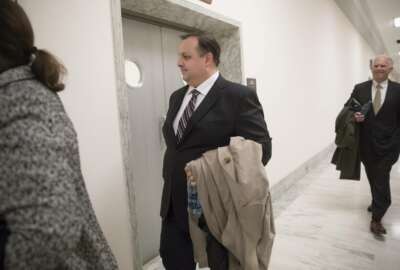
OGE’s new draft strategic plan commits to public engagement campaign
The draft plan also clarifies its mission and doubles down on past efforts like workforce development, modernization and enhancing efficiency.
Amid a flurry of new interest in the agency and its mission, the Office of Government Ethics has released a new draft strategic plan that outlines how it intends to execute its mission over the next four years. While it doubles down on past efforts like workforce development, modernization and enhancing efficiency, it also introduces some new goals, like increasing public engagement.
The draft was published Aug. 14 in the Federal Register. The office is soliciting comments and feedback until Aug. 25. While OGE will take these comments under consideration before releasing a final version, the draft signals some important new goals, strategies and directions the office is taking.
Mission
The first change in the new draft strategic plan is the emphasis on what exactly OGE’s mission is. A new section added to the beginning of the plan emphasizes precisely what the agency does and does not do.
“The Ethics in Government Act charges OGE with the unique mission of leading the government’s efforts to prevent conflicts of interest,” the plan reads, placing the emphasis on prevention, rather than enforcement. “Potential violations of legal authorities established under this framework, including government ethics authorities, are primarily investigated by the approximately 14,000 members of the staffs of Inspectors General across the executive branch. In addition, the Department of Justice has enforcement authority that includes civil and criminal penalties.”
No such distinction was made in the 2014-2018 strategic plan.
An OGE official said the office has been gradually trying to improve stakeholders’ and the public’s understanding of the scope of the agency’s authority; it’s not always clear what OGE’s responsibilities and limits are.
Public Engagement
This goes hand-in-hand with another new addition to the draft strategic plan: a new strategic goal revolving around public engagement.
“Informing the public about OGE and the executive branch ethics program gives the public confidence in the systems in place to detect and resolve conflicts of interest,” the draft reads. “Making government ethics information publicly available enables citizens to better understand the inner workings of government and its decision-making process. These two objectives combined contribute to the ability of citizens to hold executive branch agencies and officials accountable for making impartial decisions based on the interests of the public.”
Again, this is another instance of OGE officially committing to moves its been making for some time. For years, it has been pushing for greater transparency, posting documents and information online for the public to peruse.
Now, OGE is trying to raise public perception of those transparency efforts and the office’s mission through the use of strategies like increasing its presence on social media platforms, such as Twitter.
In some ways, OGE’s recent increase in public visibility is a result of these efforts, although current events have amplified OGE’s message in ways the agency didn’t expect. But its main focus in these efforts is giving the public a greater stake in holding the executive branch ethically accountable.
Feedback
The new draft strategic plan also emphasizes the importance of feedback in both its management goals and in determining the milestones it wants to hit moving forward.
The current strategic plan has a top-down focus on workforce development, revolving around improving compliance, accountability, knowledge and efficiency of ethics officials and agencies. The new draft emphasizes a more reciprocal arrangement based around feedback.
“OGE will sustain a culture of performance through continuous employee engagement, and professional development, effective communication, creation and revision of necessary policies, accountability (employee and organizational), process improvement, strong performance mechanisms, and quality human capital. OGE will strive to adapt and respond to ever changing environments,” the draft reads.
While OGE determines ethical policy for the executive branch, it’s a very small agency, with only about 80 full-time employees. So the vast majority of the work of guiding policy at the individual agencies comes from the ethics officials employed at those agencies. The 2014-2018 strategic plan estimates their number at about 5,600.
Sometimes what comes down from OGE doesn’t make sense in implementation at every agency, so OGE wants to reinforce the collaborative nature of its relationship with the agency ethics officials.
Internal processes and systems
The new draft makes a substantial shift from the 2014-2018 strategic plan on the subject of internal processes and systems. The current version committed to studying these subjects, such as privacy, IT security and records management, and improving wherever possible.
While the new draft commits to continuously “enhance and secure” its information systems and processes, it also signals a shift from a study-and-upgrade mindset to a maintenance mode.
“These efforts also include OGE maintenance of previously redesigned and streamlined workflows for agency programs that increased the use of technology, enhanced management practices, and strengthened compliance activities,” the draft reads. “OGE will also maintain a strong secure IT infrastructure, which is necessary on a day-to-day basis to allow OGE to conduct its mission-critical work.”
In recent years, OGE has been developing and upgrading systems to improve efficiency of its processes, including an electronic hiring system, electronic submissions and signatures, and the creation of the Integrity financial disclosure system.
Copyright © 2025 Federal News Network. All rights reserved. This website is not intended for users located within the European Economic Area.
Daisy Thornton is Federal News Network’s digital managing editor. In addition to her editing responsibilities, she covers federal management, workforce and technology issues. She is also the commentary editor; email her your letters to the editor and pitches for contributed bylines.
Follow @dthorntonWFED





